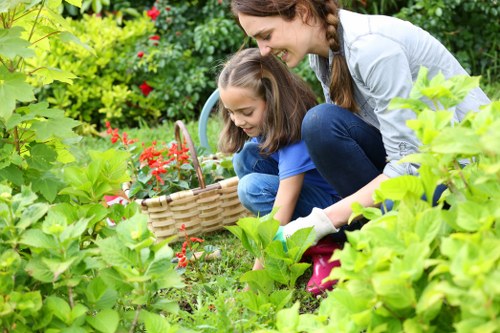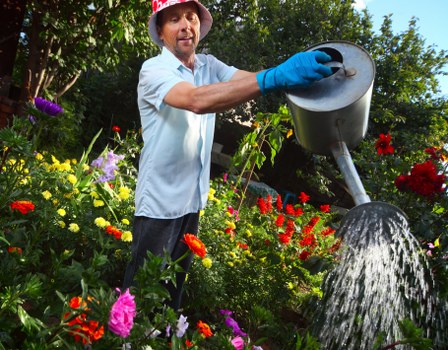Comprehensive Guide to Garden Maintenance in Cleaners W1J
Introduction to Garden Maintenance

Maintaining a vibrant and healthy garden in Cleaners W1J requires dedication, knowledge, and the right set of tools. Whether you're a seasoned gardener or a novice, understanding the essentials of garden upkeep can transform your outdoor space into a lush, thriving oasis.
Garden maintenance encompasses a variety of tasks, from regular watering and pruning to soil management and pest control. Each aspect plays a crucial role in ensuring your plants grow strong and healthy.
In this guide, we'll explore the key components of garden maintenance, providing you with actionable tips and strategies to keep your garden in pristine condition all year round.
Essential Tools for Garden Maintenance

Having the right tools is fundamental to effective garden maintenance. Investing in quality equipment can make tasks easier and more efficient, allowing you to focus on nurturing your plants rather than struggling with inadequate tools.
Here are some essential tools every gardener in Cleaners W1J should have:
- Pruning Shears: Ideal for trimming and shaping plants.
- Garden Fork: Perfect for aerating soil and removing weeds.
- Hose with Adjustable Nozzle: Essential for watering plants thoroughly.
- Gloves: Protect your hands from thorns and dirt.
- Wheelbarrow: Useful for transporting soil, plants, and debris.
Using these tools regularly can significantly enhance the efficiency and effectiveness of your garden maintenance routine.
Seasonal Garden Care

Different seasons bring unique challenges and opportunities for garden maintenance. Adapting your care routine to the changing weather conditions is vital for the sustained health of your garden.
Spring Maintenance
Spring is the perfect time to prepare your garden for the growing season. Focus on tasks such as:
- Soil Testing: Assess soil health and make necessary amendments.
- Planting: Introduce spring-flowering plants and vegetables.
- Pruning: Trim back any dead or damaged branches.
Summer Maintenance
Summer brings intense heat, requiring diligent care to keep your garden thriving:
- Consistent Watering: Ensure plants receive adequate moisture.
- Weed Control: Regularly remove weeds that compete for nutrients.
- Pest Management: Monitor and address any pest infestations promptly.
Soil Management

Healthy soil is the foundation of a flourishing garden. Proper soil management ensures that plants have access to essential nutrients and a conducive environment for root growth.
Key aspects of soil management include:
Soil Testing
Conduct regular soil tests to determine pH levels and nutrient content. This information helps in making informed decisions about fertilization and soil amendments.
Amending Soil
Add organic matter such as compost or well-rotted manure to improve soil structure and fertility. This enhances water retention and promotes beneficial microbial activity.
Mulching
Applying mulch helps retain soil moisture, suppress weeds, and regulate soil temperature. Organic mulches also break down over time, enriching the soil.
Pest and Disease Control

Protecting your garden from pests and diseases is crucial for maintaining plant health. Implementing proactive strategies can prevent infestations and minimize damage.
Integrated Pest Management (IPM)
IPM is a sustainable approach that combines biological, cultural, and chemical methods to manage pests effectively. Key elements include:
- Monitoring: Regularly inspect plants for signs of pests or diseases.
- Identification: Accurately identify the pests or pathogens involved.
- Control Measures: Implement appropriate control methods, prioritizing non-chemical options.
Natural Predators
Encourage beneficial insects like ladybugs and lacewings that prey on common garden pests. Providing habitats for these predators can naturally reduce pest populations.
Organic Treatments
Use organic pesticides and fungicides as needed to address severe infestations while minimizing environmental impact.
Pruning and Trimming
Regular pruning and trimming are essential for shaping plants, promoting healthy growth, and enhancing the overall appearance of your garden.
Benefits of Pruning
- Improved Airflow: Reduces the risk of fungal diseases by allowing better air circulation.
- Enhanced Growth: Encourages the development of strong, healthy branches.
- Aesthetics: Maintains the desired shape and size of plants.
When pruning, always use clean, sharp tools and follow best practices to avoid damaging your plants.
Timing Your Pruning
The best time to prune varies depending on the plant species. Generally, late winter or early spring is ideal for most trees and shrubs, while summer pruning works well for certain flowering plants.
Watering Strategies
Proper watering is a cornerstone of effective garden maintenance. Overwatering or underwatering can lead to a host of plant issues.
Determining Water Needs
Different plants have varying water requirements. Factors such as soil type, climate, and plant species influence how much water your garden needs.
Efficient Watering Techniques
- Drip Irrigation: Delivers water directly to the plant roots, reducing waste.
- Soaker Hoses: Provide gentle, consistent watering over larger areas.
- Mulching: Helps retain soil moisture and reduces the frequency of watering.
Implementing these techniques can ensure your plants receive adequate hydration while conserving water.
Watering Schedule
Establish a regular watering schedule based on the specific needs of your plants and the local weather conditions. Early morning watering is often recommended to minimize evaporation and allow plants to dry before nightfall.
Lawn Care and Maintenance
A well-maintained lawn enhances the beauty of your garden and provides a great space for relaxation and recreation.
Mowing Techniques
Regular mowing encourages healthy grass growth. Ensure your mower blades are sharp and set to the appropriate height for your grass type.
Fertilization
Apply fertilizers to supply essential nutrients, promoting a lush, green lawn. Organic fertilizers are a sustainable option that benefits soil health.
Weed Control
Keep weeds at bay through consistent mowing, manual removal, and applying mulches. Weeds compete with grass for nutrients and water, so controlling them is essential for a healthy lawn.
Plant Selection and Placement
Choosing the right plants and placing them appropriately within your garden is fundamental to successful garden maintenance.
Climate Compatibility
Select plants that thrive in the local climate of Cleaners W1J. Consider factors such as temperature ranges, rainfall patterns, and seasonal variations.
Sunlight Requirements
Different plants have varying sunlight needs. Group plants with similar light requirements together to ensure each species receives adequate exposure.
Soil Compatibility
Ensure the soil type matches the needs of your chosen plants. Some plants prefer well-drained sandy soils, while others thrive in rich, loamy conditions.
Composting and Waste Management
Effective composting not only reduces garden waste but also enriches your soil, promoting healthier plant growth.
Benefits of Composting
- Soil Fertility: Compost adds essential nutrients to the soil.
- Waste Reduction: Minimizes the amount of organic waste sent to landfills.
- Improved Soil Structure: Enhances soil aeration and water retention.
Setting up a compost bin in your garden allows you to recycle kitchen scraps and garden waste into valuable compost.
What to Compost
Include vegetable peels, coffee grounds, leaves, and grass clippings. Avoid composting meat, dairy, and oily foods, as they can attract pests and cause unpleasant odors.
Mulching Techniques
Mulching is a simple yet effective practice that offers numerous benefits to your garden.
Types of Mulch
Choose from organic mulches like wood chips, straw, and bark, or inorganic options such as gravel and plastic sheeting, based on your garden's needs.
Application Tips
- Layer Thickness: Apply mulch in a layer about 2-3 inches thick.
- Placement: Keep mulch a few inches away from plant stems and trunks to prevent rot.
- Maintenance: Replenish mulch as needed to maintain its effectiveness.
Proper mulching helps retain moisture, suppress weeds, and regulate soil temperature, creating a more favorable environment for your plants.
Practical Tips for Sustainable Garden Maintenance
Adopting sustainable practices in your garden not only benefits the environment but also promotes long-term garden health.
Water Conservation
Implement rainwater harvesting systems and use water-efficient irrigation methods to reduce water usage.
Organic Gardening
Use organic fertilizers and natural pest control methods to minimize chemical usage, fostering a healthier ecosystem.
Native Plants
Incorporate native plant species that are well-adapted to the local climate and require less maintenance.
Common Garden Maintenance Mistakes to Avoid
Even with the best intentions, gardeners can make mistakes that hinder their garden's growth. Being aware of these common errors can help you maintain a thriving garden.
Overwatering
Too much water can lead to root rot and other plant diseases. Ensure you understand each plant's specific water needs.
Neglecting Soil Health
Failing to maintain healthy soil can result in poor plant growth. Regularly amend and test your soil to keep it fertile.
Poor Pruning Practices
Improper pruning can damage plants and stunt their growth. Learn the correct techniques for each plant type.
Hiring Professional Garden Maintenance Services
For those who prefer to leave garden upkeep to the experts, hiring a professional garden maintenance service in Cleaners W1J can be a worthwhile investment.
Benefits of Professional Services
- Expert Knowledge: Professionals bring expertise and experience to manage your garden effectively.
- Time-Saving: Outsourcing maintenance tasks frees up your time for other activities.
- Customized Care: Services can be tailored to meet the specific needs of your garden.
Choosing the Right Service
When selecting a garden maintenance service, consider factors such as reputation, range of services offered, and pricing. Ensure they understand your vision for your garden and can deliver accordingly.
Contact us today to schedule a consultation and experience the benefits of professional garden maintenance in Cleaners W1J.
Conclusion
Effective garden maintenance in Cleaners W1J involves a combination of the right tools, seasonal care, soil management, pest control, and sustainable practices. By following the guidelines outlined in this comprehensive guide, you can cultivate a beautiful and healthy garden that enhances your outdoor living space.
Remember, a well-maintained garden not only provides aesthetic pleasure but also contributes to your overall well-being. Whether you choose to undertake maintenance yourself or hire professionals, the key is consistency and attention to detail.
Book your service now and take the first step towards a flourishing garden that you can enjoy year-round.


